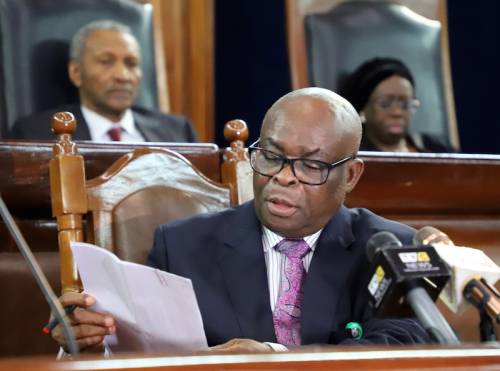
The Economic and Financial Crimes Commission (EFCC) has traced a $30,000 payment made into Walter Onnoghen’s account by Joe Agi, the Senior Advocate of Nigeria (SAN), who recently faced accusations of bribing Justice Adeniyi Ademola with N160million and a car worth N8.5million.
Agi is one of the lawyers defending Onnnoghen, the suspended Chief Justice of Nigeria (CJN), in his trial at the Code of Conduct Tribunal (CCT) for alleged fraudulent assets declaration. Ademola is a retired judge of the Federal High Court.
According to a source who disclosed the discovery to SaharaReporters, Agi paid the money to Onnoghen in 2009. He said EFCC also discovered that Onnoghen has an account with Heritage Bank that he never disclosed in his assets declaration form.
In January 2017, a witness in the trial of Justice Ademola had narrated how an N8.5million BMW luxury car was purchased for Ademola by Agi.
The witness, Ifeoma Ofornagolu, a sales consultant with Coscharis Motors, said she delivered the vehicle at the residence of Ademola in Lagos, paid for by Agi and in the name of Ademola’s son.
Ofornagolu told the court that her office confirmed the purchase by placing a call to the buyer of the vehicle.
“The receipt was issued in the name of Ademide Ademola (Mr. Ademola’s son),” she had said. “I accompanied the driver to deliver the vehicle to Ademide Ademola at number 16, Babatunde Ajose Avenue, Lekki, Lagos. The car was signed for by Mr. Ademide Ademola, who received the vehicle.”
However, in December 2018, the Court of Appeal upheld the lower court’s decision to acquit Agi of the charge on technical grounds, affirming the striking down of Sections 53 and 60 of the Corrupt Practices and other related offences Act 2000 by the High Court of the Federal Capital Territory, Maitama, Abuja.
Justice Olabisi Ige, who read the lead judgment of the three-man panel, agreed that the provisions of Sections 53 and 60 of the ICPC Act, requiring the defendants to prove that the gifts given by Agi and received by the Ademolas were not for gratification, were in conflict with the provision of the Constitution which presumes an accused to be innocent until proved guilty under the nation’s “accusatorial” criminal justice system.
The court said the testimonies given by prosecution witnesses showed that Ademide, as an adult, negotiated for the car at Coscharis auto firm, took delivery of it in Lagos, and paid for the insurance of the car, and that the cash payments could not be proven as made in order to influence court judgements.